Filter by
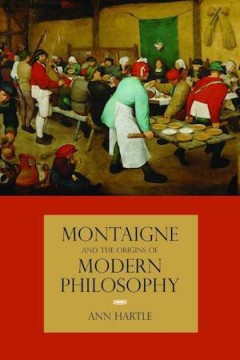
Montaigne and the Origins of Modern Philosophy
Montaigne's Essays are rightfully studied as giving birth to the literary form of that name. Ann Hartle's Montaigne and the Origins of Modern Philosophy argues that the essay is actually the perfect expression of Montaigne as what he called "a new figure: an unpremeditated and accidental philosopher." Unpremeditated philosophy is philosophy made sociable—brought down from the heavens to …
- Edition
- -
- ISBN/ISSN
- 9780810129658
- Collation
- 240 halaman
- Series Title
- -
- Call Number
- 100 HAR m
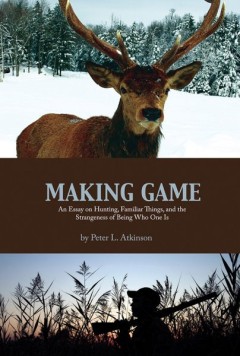
Making Game an Essay on Hunting, Familiar Things, and the Strangeness of Bein…
Making Game is a mixed-genre composition in which the author reflects on the philosophical and ethical implications of hunting wild game. This engaging essay is informed by the author’s significant background of scholarly engagement with the phenomenological tradition in modern philosophy.
- Edition
- -
- ISBN/ISSN
- 9781897425282.01
- Collation
- -
- Series Title
- -
- Call Number
- 165 pages
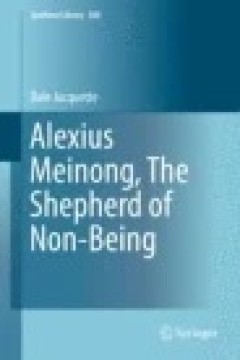
Alexius Meinong, the Shepherd of Non-Being
This book explores the thought of Alexius Meinong, a philosopher known for his unconventional theory of reference and predication. The chapters cover a natural progression of topics, beginning with the origins of Gegenstandstheorie, Meinong’s theory of objects, and his discovery of assumptions as a fourth category of mental states to supplement his teacher Franz Brentano’s references to pre…
- Edition
- 1
- ISBN/ISSN
- 978-3-319-18075-5
- Collation
- XXXII, 434
- Series Title
- Synthese Library
- Call Number
- 111 JAC a

Charles Sanders Peirce : Pragmatism and Education
This book introduces a number of selected ideas from the work of Charles Sanders Peirce, the founder of pragmatism. Peirce, pronounced ‘purse’, was born in America in 1839 and died in 1914. He published little in his own lifetime and he continually struggled to become recognised as a respected author with ideas that were highly creative, original and unique. The book begins with an examinat…
- Edition
- -
- ISBN/ISSN
- 978-94-017-7356-0
- Collation
- -
- Series Title
- -
- Call Number
- 107

Guide to Psychological Assessment with African Americans
The movements toward cultural sensitivity and evidence-based practice are watershed developments in clinical psychology. As a population with a long history of substandard treatment from mental health systems, African Americans have especially benefitted from these improvements. But as with other racial and ethnic minorities, finding relevant test measures in most psychological domains presents…
- Edition
- 1
- ISBN/ISSN
- 978-1-4939-1003-8
- Collation
- XI, 332
- Series Title
- -
- Call Number
- 158.7 GUO

Solar Calendar, and Other Ways of Marking Time
At the end of his life, Pierre Hadot was a professor at the Collège de France — a “professor’s professor” — and he helped Michel Foucault, most famously, conceptualize ethics. Hadot devoted his career to recovering the ancient conception of philosophy, according to which the discourses of universities are but a fragment of what philosophy is. His engagement with this theme helped Ben…
- Edition
- -
- ISBN/ISSN
- 978-0998531830
- Collation
- -
- Series Title
- -
- Call Number
- 100 BEN s
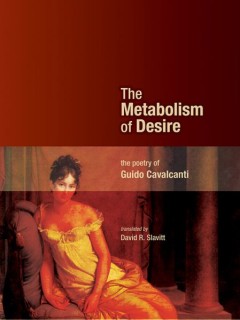
The Metabolism of Desire the Poetry of Guido Cavalcanti
It is chiefly through the translations of Rossetti and Pound that English-speaking readers have encountered Cavalcanti’s work. Pound’s famous translation, now viewed by some as antiquated, is remarkably different from the translation provided here in the graceful voice of poet David Slavitt. Working under the significant restraints of Cavalcanti’s elaborate formal structures, Slavitt rend…
- Edition
- -
- ISBN/ISSN
- 9781926836843.01
- Collation
- -
- Series Title
- -
- Call Number
- 149 pages

Handbook of Consultation-Liaison Psychiatry
This updated resource refines and expands on both the core concepts and the real-world practice of consultation-liaison psychiatry in medical settings. New and revised chapters provide background and basics and describe CL psychiatry approaches to managing a wide array of common conditions, including heart disease, dementia, anxiety and depressive disorders, alcohol and substance use problems, …
- Edition
- -
- ISBN/ISSN
- 978-3-319-11004-2
- Collation
- XVI, 561
- Series Title
- -
- Call Number
- 150 HAN
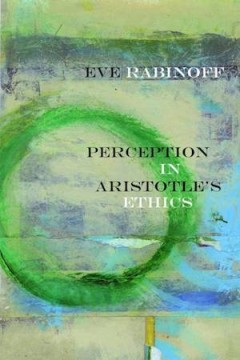
Perception in Aristotle’s Ethics : Rereading Ancient Philosophy
Rabinoff strives to account for ethical perception (aisthesis) in Aristotle's ethics—to give it a place of importance in ethical choice and action—and to offer an account of the faculty of perception expansive enough to include reception of the ethical significance of particulars. The book is motivated by particular features of Aristotle's thought and by increasing philosophical a…
- Edition
- -
- ISBN/ISSN
- 9780810136434
- Collation
- 208 halaman
- Series Title
- -
- Call Number
- 100 RAB p

Enabling Real-Time Business Intelligence International Workshops, BIRTE 2013…
This book constitutes the thoroughly refereed conference proceedings of the 7th International Workshop on Business Intelligence for the Real-Time Enterprise, BIRTE 2013, held in Riva del Garda, Italy, in August 2013 and of the 8th International Workshop on Business Intelligence for the Real-Time Enterprise, BIRTE 2014, held in Hangzhou, China, in September 2014, in conjunction with VLDB 2013 an…
- Edition
- 1
- ISBN/ISSN
- 978-3-662-46839-5
- Collation
- 80 b/w illustrations
- Series Title
- 1
- Call Number
- 1
 Computer Science, Information & General Works
Computer Science, Information & General Works  Philosophy & Psychology
Philosophy & Psychology  Religion
Religion  Social Sciences
Social Sciences  Language
Language  Pure Science
Pure Science  Applied Sciences
Applied Sciences  Art & Recreation
Art & Recreation  Literature
Literature  History & Geography
History & Geography